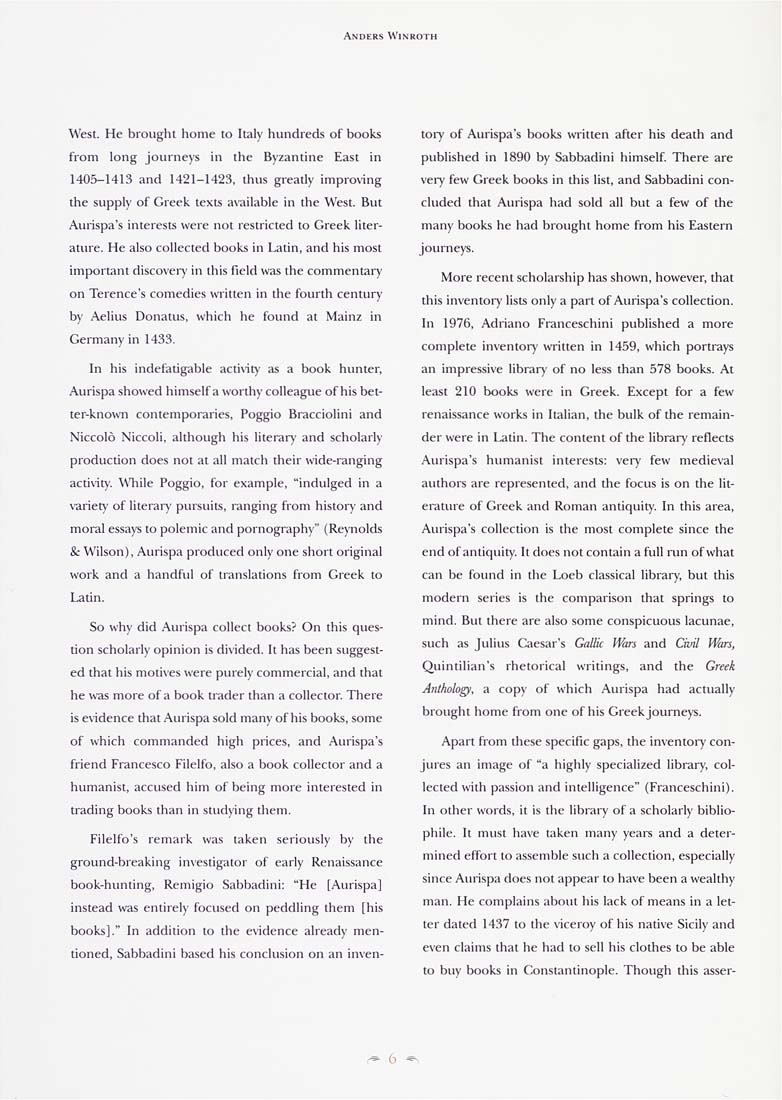Columbia Library columns (v.44(1995))
(New York : Friends of the Columbia Libraries. )
|
||
|
|
|
|
| v.44,no.1(1995:Winter): Page 6 |

West. He brought home to Italy hundreds of books from long journeys in the Byzantine East in 1405-1413 and 1421-1423, thus greatly impro\'ing the supply of Greek texts a\'ailable in the West. But Aurispa's interests were not restricted to Greek liter¬ ature. He also collected books in Latin, and his most important discoveiy in this field was the commentary on Terence's comedies written in the fourth century by Aelius Donatus, which he found at Mainz in Germany in 1433. In his indefaugable acti\it)' as a book hunter, Aurispa showed himself a worthy colleague of his bet¬ ter-known contemporaries, Poggio Bracciolini and Niccolo Niccoli, although his literar)' and scholarly production does not at all match their wide-ranging acti\'ity. "WTiile Poggio, for example, "indulged in a \'ariety of literary pursuits, ranging from history and moral essays to polemic and pornography" (Reynolds &: Wilson), Aurispa produced only one short original work and a handful of translations from Greek to Latin. So why did Aurispa collect books? On this ques¬ tion scholarly opinion is divided. It has been suggest¬ ed that his motives were purely commercial, and that he was more of a book trader than a collector. There is e\idence that Aurispa sold many of his books, some of which commanded high prices, and Aurispa's friend Francesco Filelfo, also a book collector and a humanist, accused him of being more interested in trading books than in studying them. Filelfo's remark was taken seriously by the ground-breaking investigator of early Renaissance book-hunting, Remigio Sabbadini: "He [Aurispa] instead was entirely focused on peddling them [his books]." In addition to the evidence already men¬ tioned, Sabbadini based his conclusion on an inven¬ tory of Aurispa's books written after his death and published in 1890 by Sabbadini himself There are very few Greek books in this list, and Sabbadini con¬ cluded that Aurispa had sold all but a few of the many books he had brought home from his Eastern journeys. More recent scholarship has shown, however, that this inventor)' lists only a part of Aurispa's collection. In 1976, Adriano Franceschini published a more complete inventory written in 1459, which portrays an impressive library of no less than 578 books. At least 210 books were in Greek. Except for a few renaissance works in Italian, the bulk of the remain¬ der were in Latin. The content of the librar)' reflects Aurispa's himianist interests: very few medieval authors are represented, and the focus is on the lit¬ erature of Greek and Roman antiquity. In this area, Aurispa's collection is the most complete since the end of antiquity. It does not contain a full run of what can be found in the Loeb classical library, but this modern series is the comparison that springs to mind. But there are also some conspicuous lacunae, such as Julius Caesar's Gallic Wars and Civil Wars, Quinlilian's rhetorical writings, and the Greek Anthologf, a copy of which Aurispa had actually brought home from one of his Greek Journeys. Apart from these specific gaps, the inventoiy con¬ jures an image of "a highly specialized library, col¬ lected with passion and intelligence" (Franceschini). In other words, it is the library of a scholarly biblio¬ phile. It must have taken many years and a deter¬ mined effort to assemble such a collection, especially since Aurispa does not appear to have been a wealthy man. He complains about his lack of means in a let¬ ter dated 1437 to the viceroy of his native Sicily and even claims that he had to sell his clothes to be able to buy books in Constantinople. Though this asser- |
| v.44,no.1(1995:Winter): Page 6 |







